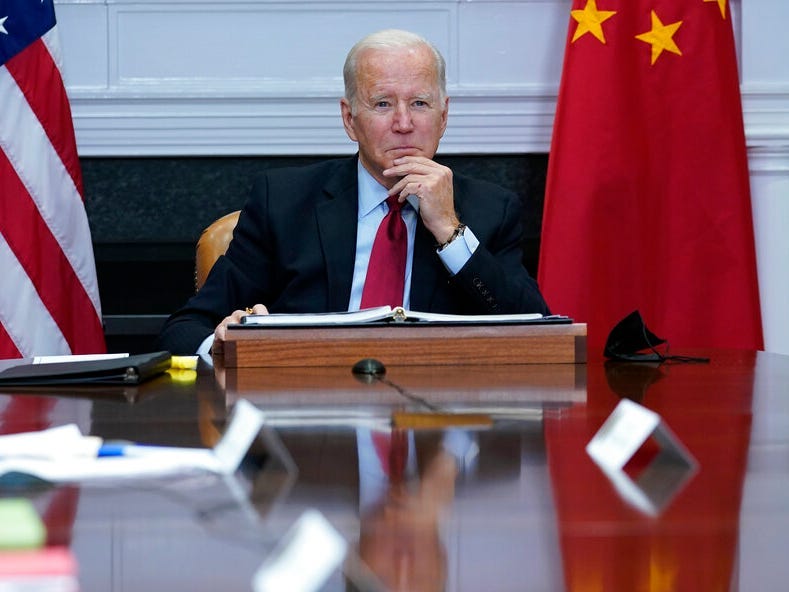- Kellyanne Conway in her new book says the GOP's "Beijing Biden" attacks didn't connect with voters.
- Conway described Trump's 2020 presidential reelection effort as "more solipsistic than scrappy."
- Biden during his presidency has received pushback from China for his posture regarding Taiwan.
In 2020, then-President Donald Trump and his GOP allies tried earnestly to link then-Democratic presidential nominee Joe Biden to China, arguing that the former vice president would be beholden to the economic giant.
While campaigning for reelection in Ohio weeks before the November general election, Trump warned that Biden's ascent to the White House would halt gains in the manufacturing sector.
"Put simply, if Biden wins, China wins," Trump said at the time, per The Associated Press.
At that year's Republican National Convention, Trump's eldest son, Donald Jr., dubbed the Democrat as "Beijing Biden" while charging that his father's political rival had the support of the Chinese government.
However, Kellyanne Conway, who managed Trump's successful 2016 presidential campaign, was not a fan of the Republican strategy regarding China, according to her newly-released memoir.
In the book, "Here's the Deal," the former Trump senior counselor wrote that the push to link to Biden to the Chinese Communist Party didn't connect with voters, most of whom were tackling an array of challenges created by the COVID-19 pandemic in 2020.
"'Beijing Biden' was a foolish attack line. It lacked the Trumpy one-two punch and resonance of 'Crooked Hillary,' which was easy to discern, and people felt actually affected them. It also suggested a dearth of seriousness during a national crisis where folks were more concerned about another city in China: Wuhan," Conway wrote.
She added: "The wartime president, in control, commanding private companies, government agencies, and pharmaceutical innovators, surging supplies, providing resources and information daily to a worried nation: Now, that would have made an easy-to-understand and compelling ad!"
The veteran pollster in her book further reiterated that Trump's reelection effort lacked the "outsider candidate" mentality of the 2016 campaign and was reminiscent of former Secretary of State Hillary Clinton's presidential candidacy that year.
"The $1.4 billion reelect, with its often-absent campaign 'manager' was more solipsistic than scrappy," she wrote of Trump's 2020 bid. "As I told him, 'You were the underdog both times even though you were the president of the United States the second time. But what you didn't have this time was the hunger and the swagger.'"
Since entering the White House last year, Biden has had several foreign policy rifts with China, largely as it relates to the United States' stance of "strategic ambiguity" regarding Taiwan, which the Chinese government considers a breakaway province.
Last November, Chinese leader Xi Jinping informed Biden that his administration was "playing with fire," as the White House in the past has had to walk back statements where the president seemingly remarked that the US would aid in defending Taiwan if it was attacked by China.
When asked on Monday if a Chinese invasion of Taiwan would prompt the US to use military force, Biden responded in the affirmative.
"That's the commitment we made," he said while at a joint press conference with Japanese Prime Minister Fumio Kishida in Tokyo. "The idea that it [Taiwan] can be taken by force, just taken by force, is just not appropriate."
A Biden White House staffer later said in a statement that the president "reiterated" the country's resolve "to provide Taiwan with the military means to defend itself," while adding that "our policy has not changed."
